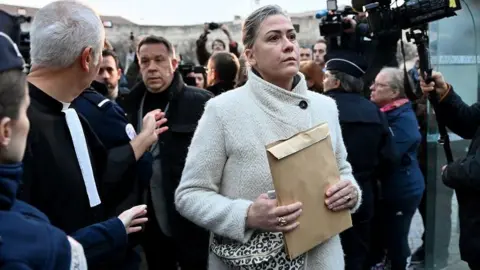Gisèle Pelicot's ex-husband jailed for 20 years in mass rape trial

Ms Pelicot's ex-husband Dominique Pelicot - who had already confessed to his crimes - was found guilty of aggravated rape.
He was also found guilty of the attempted aggravated rape of the wife of one of his co-accused, Jean-Pierre Maréchal.
Maréchal - who was described as Dominique's "disciple" as he drugged and raped his own wife for years and invited Dominque to do the same - was jailed for 12 years.
Dominique Pelicot was also found guilty of taking indecent images of his daughter, Caroline Darian, and his daughters-in-law, Aurore and Celine.
Caroline - who was in court on Thursday - previously told the trial she felt she was the "forgotten victim" as, unlike in her mother's case, there was no record of the abuse she is convinced was inflicted on her.
Dominique denied drugging and abusing his daughter.
"I will never come see you and you will die alone like a dog," she shouted at him in court in November.
After the verdict were delivered, Dominique Pelicot's lawyer said her client was "somewhat dazed" by his sentence and would consider whether to appeal. He has 10 days to decide whether to do so.
Dominique Pelicot stood accused alongside 50 other men, 46 of whom were found guilty of rape, two of attempted rape and two of sexual assault.
Several of them have already spent years in jail as they were arrested when police conducted their initial investigation in 2021, and will therefore be free relatively soon.
Most of the men on trial had denied that what they did was rape.
They argued they did not realise Ms Pelicot was unconscious and therefore did not "know" they were raping her. It is an argument that sparked a nationwide discussion about France's legal definition of rape.
The defendants' jail terms range from between three and 15 years.
In a statement to AFP news agency, the Pelicot children said they were "disappointed" by the "low sentences".
For almost a decade from 2011, Dominique Pelicot drugged his now ex-wife and raped her, and recruited dozens of men online to have sex with her while she was unconscious.
His crimes were discovered in 2020, when police arrested him over a separate charge of filming up the skirts of women in a supermarket.
Police seized his devices and found thousands of videos on his laptop, with evidence of around 200 rapes.
Investigators used the videos to track down his co-accused, although they were unable to identify an additional 21 men.
Dominique Pelicot admitted the charges in 2020.
 Getty Images
Getty ImagesThe trial sparked a discussion about whether the issue of consent should be added to France's legal definition of rape, as it has been in other European countries.
Rape in France is currently defined as "any act of sexual penetration committed against another person by violence, constraint, threat or surprise", meaning prosecutors must prove intent to rape.
Many of the defendants argued they did not realise Ms Pelicot had not consented, claiming they were "tricked" by Dominique Pelicot, and believed they were going to the couple's house for a threesome involving a fantasy that the woman would be asleep.
The trial also shone a light on the issue of chemical submission, or drug-induced sexual assault.
Most of the 50 men came from towns and villages in a 50km (30 mile) radius of the Pelicots' home village of Mazan.
They included firefighters, lorry drivers, soldiers, a journalist and a DJ, and were been described by defence lawyers as being "ordinary people", earning them the nickname Monsieur-Tout-Le-Monde (Mr Everyman).
The trial also brought sexual violence against women into the spotlight in France, with many praising Ms Pelicot for her bravery in opening up the case to the public.
She previously said she was determined to make "shame change sides" from the victim to the rapist. It is a phrase that has been repeated by her supporters.
But Ms Pelicot has been clear that behind her facade of strength "lies a field of ruins" and despite the widespread acclaim for what she has done, she is a reluctant hero.
"She keeps repeating, 'I am normal' - she does not want to be considered as an icon," her lawyer Stéphane Babonneau told the BBC.
"Women generally have a strength in them that they can't even imagine and that they have to trust themselves. That's her message."
Source: BBC
























































